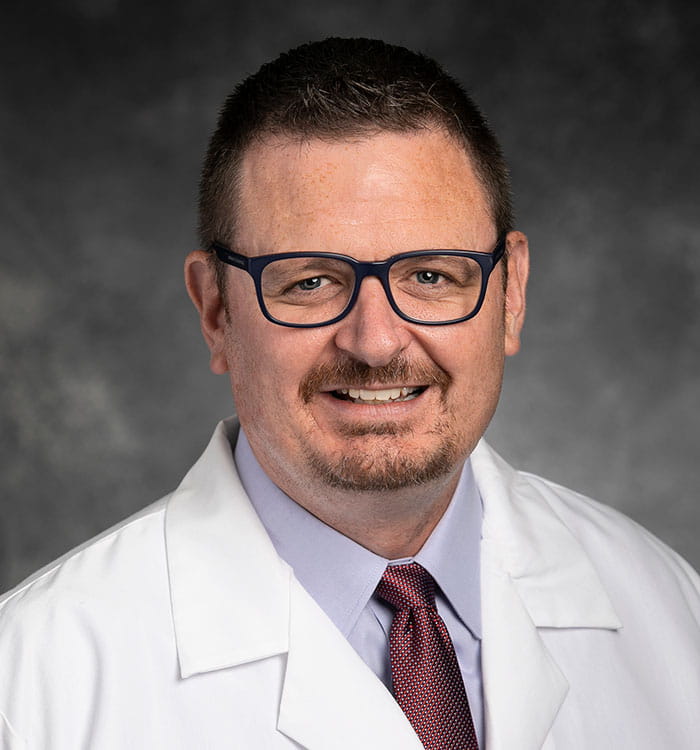Research Highlight: Improving Outcomes in Sepsis and Critical Care
November 09, 2021
Innovations in Pulmonology & Sleep Medicine | Fall 2021
Sepsis is a leading cause of morbidity and mortality worldwide, accounting for approximately 6 million deaths annually. In patients with sepsis, simultaneous proinflammatory and anti-inflammatory immune responses lead to life-threatening organ damage. Furthermore, patients seriously ill with COVID-19 are more likely to be vulnerable to sepsis, so there’s an urgent need for more innovative ways of diagnosing and treating it.
 Kenneth Remy, MD, MSCI, FCCM
Kenneth Remy, MD, MSCI, FCCMKenneth Remy, MD, MHSc, MSCI, FCCM has recently relocated his research lab to University Hospitals Cleveland Medical Center to pursue solutions to the challenges of caring for sepsis patients. He is a physician in the Departments of Internal Medicine, Pediatrics, Pathology and Biochemistry in the Divisions of Pulmonary Critical Care Medicine and Pediatric Critical Care Medicine.
Personalized Medicine in Real Time
Time is of the essence in treating sepsis. Inflammation and compensatory immunosuppression may both be at work simultaneously, making it challenging to effectively treat sepsis patients in a timely manner. In addition, patients’ individual immune systems vary, further complicating clinicians’ ability to diagnose, risk stratify and treat patients appropriately. It is imperative that clinicians be able to more quickly and precisely measure a patient's dynamic immune status and assess the potential effect of different medical interventions.
“One area of interest in my lab is to understand the phenotype of the immune system — in real time — for patients with sepsis,” says Dr. Remy, who is a National Institutes of Health-funded physician-scientist. “Traditionally, it’s taken a couple of days to assess immune status. By then, the immune system has already changed, so it’s not really helpful to provide therapy to patients without a clear understanding of their immune system in real time.”
To that end, Dr. Remy’s team has developed an assay that allows clinicians to look quickly at the profile of a patient’s immune system at a given point in time and apply alternative therapies to the assay to see which ones are most likely to work. It also means clinicians can treat those at highest risk with earlier interventions.
Recognizing and quickly implementing a best practice therapy for each individual patient lessens early sepsis mortality and prevents initial organ injury, Dr. Remy says.
“We’ve treated so many diseases with a one-size-fits-all program,” he says. “This is why so many of our therapies that are targeted against a specific disease part or entity have been unsuccessful. Finding new understandings and new ways and pathways to modulate the immune system, and finding new ways to treat patients precisely, in real time, are important. University Hospitals Cleveland Medical Center and Case Western Reserve University are leading the challenge in that endeavor.”
Understanding Lysis in Sepsis
Red blood cells contain numerous immune-modulating mediators that affect and change immune cell function. During sepsis-related lysis, red blood cells release heme, which causes immune dysregulation, Dr. Remy says.
“In my lab, we are trying to understand how lysis causes dysregulation and if there are things we could actually do to impact this, or modulate these immune findings, in a fashion that will improve outcomes. This is a new area in the world, and we want University Hospitals Cleveland Medical Center to lead the effort in understanding hemolysis-driven immune dysregulation.”
Understanding Critical Illness Across the Lifespan
Dr. Remy heads up critical care research at University Hospitals Cleveland Medical Center for adults and children.
“We really want to home in on understanding the nuances between children of different ages and ethnicities, and the contributions of disparities in a lot of these critical illnesses,” he says. “We also want to understand how adults and children can bi-directionally inform the care of one another. So we are hitting this research in a comprehensive fashion and using cutting-edge evaluation and cutting-edge potential development of new therapies so we can impact those at death’s door.”
For more information about Dr. Remy’s research, call 216-844-3201.
Contributing Expert:
Kenneth Remy, MD, MHSc, MSCI, FCCM
Director for Basic Science and Translational Research
Pulmonary Critical Care Medicine
University Hospitals Cleveland Medical Center
Co-Director for Clinical, Basic Science and Translational Research
Pediatric Critical Care Medicine
University Hospitals Rainbow Babies & Children’s Hospital
Clinical Associate Professor of Medicine
Case Western Reserve University School of Medicine


